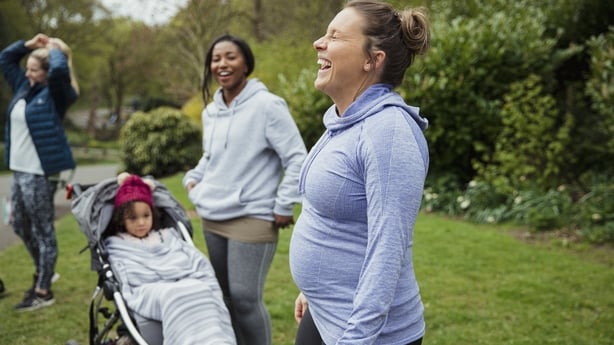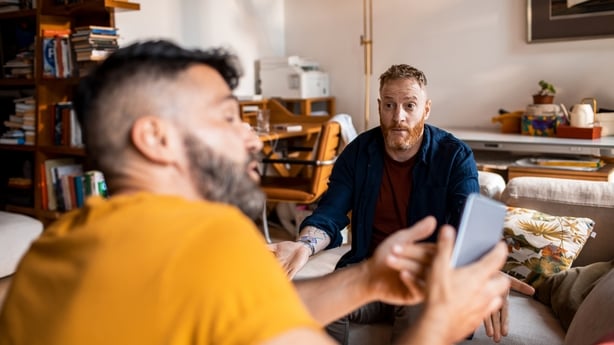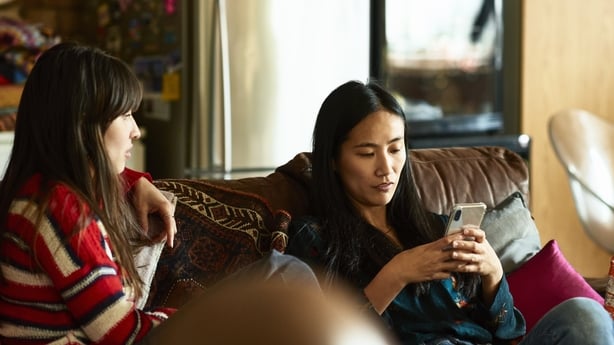When people have 'chemistry', they have chemistry. It's not just a turn of phrase: it’s science, according to Dr Malie Coyne. The author and Clinical Psychologist was sharing her expertise on the topic of toxic friendships on Today with Claire Byrne.
Malie spoke about the feelgood brain chemicals that are triggered by love and friendship, which are in short supply when things get toxic. Given that we can’t measure our own brain chemistry, recognising toxicity in relationships can be tricky, but there are behavioural signs to look out for.
Human connection is essential to our emotional development and we suffer without it, Dr Coyne says. It's something we’ve all confronted during Covid:
"Friendships are the key to our emotional and physical health. We learn about who we are through our relationships. Humans are so deeply social and our most joyful and sad moments derive from a feeling of belonging with close others and that’s why the last two years have been so difficult for people."

The benefits of friendship last longer than the good times we have with our friends. Dr Coyne says there is solid science behind why you like someone and want to spend time with them:
"When you have a good laugh with someone, you feel like the very best version of yourself. And why is that? Because it releases your feel-good brain chemicals. When we are born to our mothers we have a release of oxytocin in our brains, which is our love hormone.
"Well, that gets released when you’re really close to a good friend, and also you have endorphins which can act as a pain reliever and serotonin which is an anti-depressant. So, loads of really good chemicals are released when you’re with somebody that you’re enjoying spending time with."
The reverse is also true, Malie says:
"Equally, we feel those things very acutely, the opposite of them when we’re with a more toxic friend."

Things get a little complicated when it comes to friendships that started well but become uncomfortable over time. Does that mean they have become toxic? Dr Malie cautions against deciding an individual is a "toxic person".
"Sometimes friends who were good friends initially can become more toxic. I don't want to put people down and say that’s a 'toxic person', so we completely disregard that person. Because very often when people show negative behaviours, there’s usually stuff going on in their lives."
Friends can behave badly on a once-off basis, Dr Coyne says; usually because the situation has exposed their vulnerabilities. She says that if someone hurts you, it doesn’t necessarily mean they are a bad person; maybe it’s just a tough situation for them:
"Say somebody turns 40 and everybody around them is having babies and they haven’t had a baby, it might be difficult for them to rejoice in somebody having a baby and it doesn’t necessarily mean that they’re toxic."

Malie says we are all capable of screwing up from time to time, even with those closest to us:
"We’re all imperfect human beings. And we all mess up. We mess up in all our relationships. It doesn’t matter which relationship, we mess up with our kids, we mess up with our husbands, with our partners, with our work partners, with our work colleagues. We are imperfect human beings pretending we’re perfect when we’re not. So, if it’s like a one-off, I think you’re kind of looking at it in a different way."
Toxic relationships are real, and Dr Coyne says there are some red flags to look out for. She says inequality could be a sign of toxicity, where all the giving is on one side and the taking is on another:
"Do they have time for your problems? So, you might be helping them through tough times; are they able to there for you when you have a tough time? A toxic person might be more likely to dismiss your feelings and say they don’t have time for you, ignore you."

If you have doubts about a particular friendship, another question to ask yourself is, how does that person react to your success? Dr Coyne says:
"Something really good happens in your life and they don’t share that joy and they might try to drag you down for their benefit; they might belittle something."
These signs are not enough to prove toxicity unless they are repeated over time. Malie says that a toxic relationship is defined by a pattern of behaviour:
"If this happens over time and it’s a repeated thing, you know, that there’s no understandable reason for it. That you’re going, OK, I can understand why they mightn’t be so joyful about me having a baby when they’re trying to have a baby – that's understandable."
Trusting your instincts is important. If you feel you are constantly changing your own behaviour when you're with someone and that the friendship might not last if you didn't, maybe it’s time to walk away.
Getting to that point is harder for some people than for others, Dr Coyne says:
"If during an interaction you’re feeling, I’m not feeling the best version of myself here. I’m feeling like I need to be curtailing what I say, or I’m walking on eggshells with this person, filtering the conversation or changing the way you look or whatever it is; then you know that something doesn’t feel quite right. But it can be hard for some people more than others to recognise that."

Lifelong friends are great, but we don’t have to keep all of our friends for life, according to the psychologist. Malie says it’s OK to end a friendship if you are no longer comfortable with it:
"We do not have to have friendships for life. We have friendships very often for seasons of our lives. And it’s OK. A lot of friendships naturally taper off and something major may not have happened."
She says it can help to think about it in terms of people who add warmth to your life and people who sap your energy:
"Have the mantra in your mind to fill your life with radiators not drains."
If you want to hear more about the subtleties of recognising a toxic friend, ghosting and the tricky process of leaving a toxic friendship, have a listen back to Claire’s full interview with Dr Coyne above.



